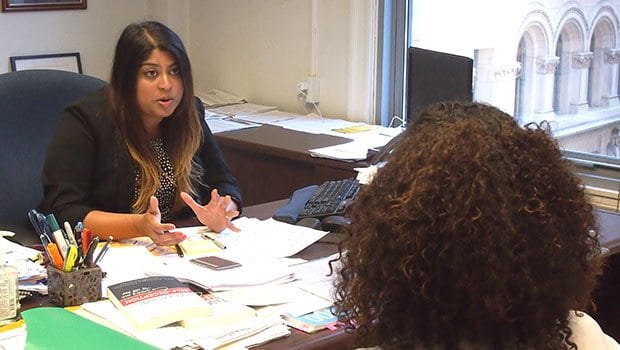
Entrepreneurs thinking about starting a small businesses face an important decision in determining what kind of legal entity their venture will be. Failure to incorporate a business leaves entrepreneurs liable in the event their business is sued.
“There are definitely benefits to incorporation in all areas of your life,” says Priya Lane, an attorney with the Lawyers’ Committee for Civil Rights and Economic Justice. “A lot of people don’t want to spend the money, but it’s well worth it.”
The $275 Massachusetts filing fee might set entrepreneurs back a bit, but in exchange their personal assets — their home, savings and personal possessions — will be protected from lawsuits filed against their business. And Lane, who heads the Lawyers’ Committee’s Belin Economic Justice Project, can help businesses through the process, from determining which legal entity a business should take, to filing the necessary paperwork.
“We had a client who was an immigrant woman who believed she was incorporated,” Lane said. “We looked through her papers and said, ‘No, you’re not.’”
The woman, Lane says, was herself a DBA, meaning “doing business as.” The name of her restaurant appeared on the checks she wrote to suppliers, but if a customer got food poisoning and decided to sue, it was her own assets that would be in jeopardy.
“There’s a lot of liability when you’re selling food,” Lane notes.
The project Lane heads has this year connected more than 120 entrepreneurs with legal assistance from attorneys who volunteer with the Lawyers’ Committee. The lawyers are based at white-shoe firms that are affiliated with the Lawyers’ Committee. The firms typically place limits on the amount of revenue an entity can generate to qualify for free legal services.
They offer help with legal dilemmas ranging from intellectual property to employee classification.
“A lot of employers believe they can categorize their employees as individual contractors,” Lane says. “Usually, they can’t. Massachusetts has strict laws around that.”
A promising sign for Boston’s business community is the number of entrepreneurs who come to the Lawyers’ Committee seeking help copyrighting intellectual property — which can be anything from a company logo to a recipe.
“More and more, we’re getting business owners coming to us at the beginning of the process,” Lane said.
Clients are referred to the Lawyers’ Committee through organizations that help start-ups, including Mass Growth Capital Corporation, which helps businesses with financing, and Commonwealth Kitchen, a food services incubator.
“We’re starting a food industry-specific workshop called Food Biz 101,” Lane says.
The workshop will cover the basics of how to start and scale up a successful small business.
“They need to know how to cost out their goods and find price points when they’re using multiple ingredients in multiple ways,” she adds.
Other areas covered will include the basics of entity formation, labeling regulations and how to write a catering contract.
While the legal services the Lawyers’ Committee offers are restricted to businesses with limited revenues, the classes they offer are open to all. Lane says the aim is to offer businesses run by people of color and immigrants access to the best advice.
“We really believe that minority entrepreneurs should have access to all the same legal resources that everyone else has,” she says.
While business formation takes up much of the lawyers’ time, many come in seeking help simply staying afloat. In Boston’s heated real estate market, businesses often find themselves embroiled in landlord-tenant disputes.
“A lot of time they complain about rent increases, but when you ask them if they have a lease, they say they don’t,” she says.
Landlords will often tell businesses they’ll charge them less for rent if they don’t request a lease. But not having a lease leaves businesses open to unpredictable increases and evictions. Lane advises businesses to ask for a lease.
“What’s going to happen when the landlord says ‘I’m selling the business. You have to be out in a month?’”
And if a landlord is in the process of evicting a tenant, having an attorney is even more crucial.
“We’ve had businesses call us and say their landlord put an eviction notice on our door and it’s not even an eviction notice, not an actual legal document,” Lane says.







